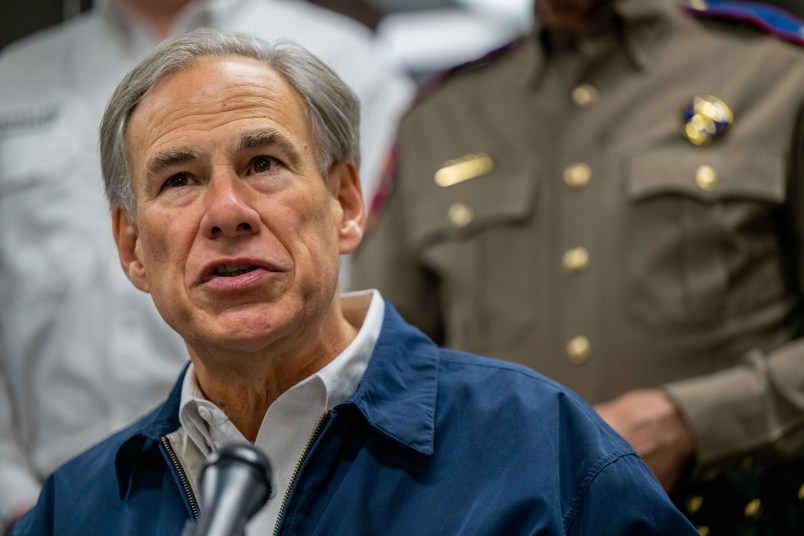With nearly $1 billion spent, Texas officials are gearing up to dish out far more cash for a wall along the U.S.-Mexico border.
In recent months, officials with Texas Gov. Greg Abbott (R)’s administration have said two things: That they’ve run out of money to keep issuing contracts for new wall segments, and that they’re counting on the state legislature to deliver them more.
It’s already a gargantuan infrastructure project, as Abbott attempts to finish in Texas what Trump, at least rhetorically, started in 2015: a wall that covers the entire U.S.-Mexico border. At one February meeting, Texas officials said that they’ve spent $878 million on the project so far. The Texas Facilities Commission, the state agency delegated to build the wall, has contracted to build 37 miles of wall so far, and, one official said at the February meeting, is pursuing 190 easements for the first stretches of wall. A Laredo, Texas official said this year that the state is offering locals $18,000 for right-of-way.
Like many Abbott border gambits, the wall has sucked up a lot of money, and not everyone in the state thinks that it’s a wise use of resources, including — and perhaps especially — those on the border.
It’s “a slap in the face,” said Amanda P. Aguero, the mayor pro tem of Rio Bravo, a small town that runs up against the Rio Grande river south of Laredo.
Aguero told TPM that state officials have not contacted her, and that her town would feel far more secure with increased funding for local police, cameras, and Border Patrol than with the proposed wall.
“It puts me in a predicament, mainly because our constituents come to me and they ask, ‘when is this happening, why did you allow it? Are property taxes gonna go down? Is this going to be a forever wall? We go fishing there, why are we allowing this?'”
“And I have no answers, because I was never approached,” Aguero said.
Follow the money
Abbott has drawn on several pots of money to fund the wall to date.
Around $54 million comes from a somewhat quixotic attempt to crowdfund the wall — a state government-backed echo of the We Build The Wall project, an earlier, private, crowdfunded effort to build Trump’s wall which ended in the indictment of Stephen K. Bannon and others. (Bannon was later pardoned by Trump.)
According to the Texas Tribune, the Texas crowdfunding effort raised nearly $54 million, $53.1 million of which came from a conservative Wyoming billionaire named Timothy Mellon, a descendent of banking mogul and Coolidge Administration Treasury Secretary Andrew Mellon.
The remaining $800 million has come from a variety of sources, Jamie Puente, director of economic opportunity at progressive think tank Every Texan, told TPM. Puente, a former legislative director in the Texas House, has tracked Abbott’s border security funding since it began in 2021.
Another large pot of money for wall funding, Puente said, was created as a result of Abbott declaring an emergency at the border in 2021.
Part of that plan involved a convoluted scheme that allowed the state to use federal COVID-19 aid for the effort while circumventing congressional restrictions on how the money could be spent.
Per reporting from The Nation, Abbott used money from the CARES Act to replace state agencies’ revenues.
That freed up around $2.5 billion which partly went to Abbott’s office in the form of disaster grants, some of which have been used to fund the wall.
More to come
Politicians representing the border parts of Texas have spoken out at times against the funding.
State Sen. Chuy Hinojosa (D), who sits on the Texas Senate’s Finance Committee and represents McAllen, called the operation a “bottomless pit” for state funds last year.
But the opposition of those along the border is unlikely to stop Abbott from shoveling more money at the project.
The State Facilities Commission said in January that it can’t issue more contracts to build the wall without additional funding from the state legislature.
Sen. Joan Huffman (R), chair of the state Senate’s Finance Committee, filed a bill in January that would allot $4.6 billion for border security. If passed, Abbott would receive $1 billion in grants that he will be able to dole out to the Facilities Commission for new construction contracts.
Once the wall is built, the state will also be required to maintain it. That, the Facilities Commission projects, will add up to around $54 million per two year legislative session.
To Aguero, the Rio Bravo mayor, it creates a bizarre sense of uncertainty.
“It’s great that they want a solution, but the solution they’re bringing is so quick and sneaky and expensive,” she said. “I’m trying to understand it because I can’t understand it.”






